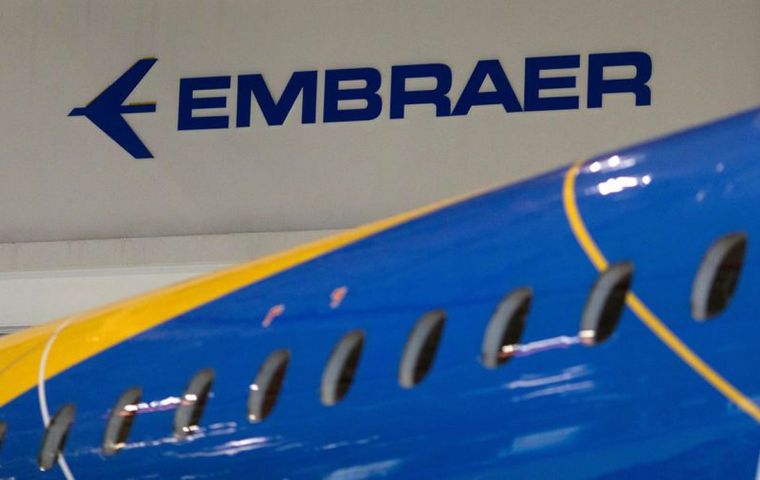MercoPress. South Atlantic News Agency
Collapse of Boeing deal plunges Brazilian plane maker Embraer into an uncertain future
 Embraer faces a historic crisis with isolation reinforced by the breakup two years after Airbus absorbed Embraer’s main competitor, the Canadian-designed A220.
Embraer faces a historic crisis with isolation reinforced by the breakup two years after Airbus absorbed Embraer’s main competitor, the Canadian-designed A220. Brazilian planemaker Embraer SA has been thrust into an uncertain future with no immediate plan B, while not ruling out seeking a bailout after Boeing Co jettisoned a US$ 4.2 billion commercial aerospace tie-up amid the coronavirus crisis.
The company’s shell-shocked chief executive, in the job for a year with little aerospace experience, sought to rally staff after the board held late-night talks to review the collapse of plans for surviving mounting aerospace competition.
“Our history is full of difficult moments, and we have overcome all of them,” Francisco Gomes Neto told Embraer’s 20,000 staff before giving them a thumbs up.
But Embraer now faces a historic crisis with its isolation reinforced by the breakup - two years after Europe’s Airbus (AIR.PA) absorbed Embraer’s main competitor, the Canadian-designed A220.
“For Embraer, it could be very damaging,” said Teal Group consultant Richard Aboulafia, noting it was the only significant independent jetmaker.
“It’s hard to pressure your suppliers when the volume you’re offering is a fraction of your competition’s”. Embraer’s immediate aim is to reassure investors. It pledged cost savings and said it had solid liquidity.
It also tore up arguments previously used to persuade unions and regulators to back the deal, saying it could survive without Boeing rather than stating the deal would be its “salvation”.
The former state-owned company has not asked for a bailout but says it is open to “complementary” sources of financing.
Brazilian companies, including airlines and automakers, are in bailout discussions.
Embraer “will need strong government support to recover the (separation) expenses and recover from the economic crisis caused by coronavirus,” said Aurelio Valporto, who heads minority shareholder group Abradin and opposed the deal.
Embraer had two main pitches for investors that have now vanished.
First, it would pay US$ 1.6 billion in dividends from the sale. Second, it would receive enough cash to wipe debts clean and rejuvenate defense and executive-jet units. As a revamped company, Embraer would get a fresh start.
Executives also hoped Boeing’s marketing would be a silver bullet for the commercial arm, to be 80%-owned by Boeing. Instead, Embraer now has a crisis committee that meets daily and no end in sight for its troubles.
Sales of its E2 have lagged. Overall jet demand has vanished due to coronavirus. Now, crashing oil prices have further weakened the case for new jets, sold mainly on fuel efficiency.
Industry sources said Boeing needed room to maneuver as it seeks U.S. government support for the U.S. aerospace industry. With the crisis expected to resurrect economic barriers, it was seen in a corner over moves to acquire thousands of Brazilian engineers while drawing up plans to lay off its own staff.
“You can’t easily go to Congress and ask for support and spend the money on an acquisition,” a senior source said.
Embraer says Boeing scuppered the deal on technicalities because of its own financial problems. Boeing says it pulled out only because Embraer failed to meet conditions. But the row itself could be damaging.
The breakup also leaves uncertainty for Embraer employees, many of whom were expected to work on future Boeing programs. Embraer had already furloughed more than 90% of its main Brazil plant due to the crisis.




Top Comments
Disclaimer & comment rulesCommenting for this story is now closed.
If you have a Facebook account, become a fan and comment on our Facebook Page!